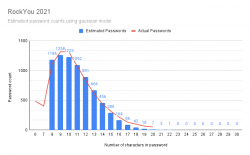Passwords - Part 3 of 2 - Follow up
Thursday, June 17. 2021
This is part three of my two-part post. My thoughts on passwords in general are here and about leaked passworeds here.
I'm writing this to follow-up on multiple issues covered in previous parts. Some of this information was available at the time of writing but I just had not found it in time, some info was published afterwards but was closely related.
Troy Hunt's thoughts on RockYou2021
His tweet https://twitter.com/troyhunt/status/1402358364445679621 says:
Unlike the original 2009 RockYou data breach and consequent word list, these are not “pwned passwords”; it’s not a list of real world passwords compromised in data breaches, it’s just a list of words and the vast majority have never been passwords
Mr. Hunt is the leading expert on leaked passwords, so I'm inclined to take his word about it. Especially when he points the RockYou2021 "leak" to contain CrackStation's Password Cracking Dictionary. Emphasis: dictionary. The word-list will contain lists of words (1,493,677,782 words, 15GB) in all known languages available. That list has been public for couple of years.
IBM Security survey
Press release Pandemic-Induced Digital Reliance Creates Lingering Security Side Effects. Full report PDF.
In number of visualizations contained in the report, there is this one about password re-use:
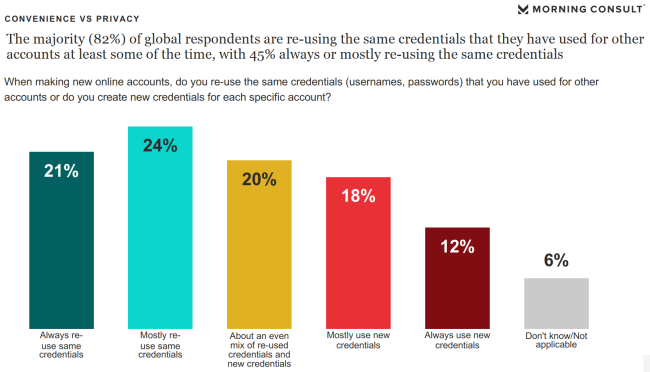
65% of participants are using same passwords always, mostly or often. That's seriously bad! ![]()
However, this is nothing new. It is in-line with other surveys, research and available data.
STOP re-using your passwords. NOW!
If you aren't, educate others about the dangers. Help them set up password managers.
Microsoft
ZDnet article Microsoft's CISO: Why we're trying to banish passwords forever descibes how Microsoft will handle passwords.
1: Employees at Microsoft don't have to change their passwords every 71 days.
Quote from Microsoft and NIST Say Password Expiration Policies Are No Longer Necessary :
Microsoft claims that password expiration requirements do more harm than good because they make users select predictable passwords, composed of sequential words and numbers, which are closely related to each other. Additionally, Microsoft claims that password expiration requirements limit containment because cybercriminals almost always use credentials as soon as they compromise them.
Nothing new there, except huge corporation actually doing it. This policy is described in NIST 800-63B section 5.1.1.2 Memorized Secret Verifiers, which states following:
Verifiers SHOULD NOT require memorized secrets to be changed arbitrarily (e.g., periodically).
However, verifiers SHALL force a change if there is evidence of compromise of the authenticator.
Also, multiple sources back that up. Example: Security Boulevard article The High Cost of Password Expiration Policies
2: "Nobody likes passwords"
A direct quote from Microsoft CISO Bret Arsenault:
Because nobody likes passwords.
You hate them, users hate them, IT departments hate them.
The only people who like passwords are criminals – they love them
I could not agree more.
3: End goal "we want to eliminate passwords"
Even I wrote, this can not be done in near future. But let's begin the transition! I'm all for it.
The idea is to use alternate means of authentication. What Microsoft is using is primarily biometrics. That's the same thing you'd be doing with your phone, but do the same with your computer.
Doing passwords correctly
When talking about computers, security, information security, passwords and so on, it is very easy to paint a gloom future and emphasize all the bad things. Let's end this with a positive note.
Auth0 blog post NIST Password Guidelines and Best Practices for 2020 has the guidelines simplified:
-
Length > Complexity: Seconding what I already wrote, make your passwords long, not necessarily complex. If you can, do both! If you have to choose, longer is better.
-
Eliminate Periodic Resets: This has already been covered, see above. Unfortunately end-users can not do anything about this, besides contact their admins and educate them.
-
Enable “Show Password While Typing”: Lot of sites have the eye-icon to display your password, it reduces typos and makes you confident to use long passwords. Again, nothing for end-user to do. The person designing and writing the software needs to handle this, but you as an end-user can voice your opinion and demand to have this feature.
-
Allow Password “Paste-In”: This is a definite must for me, my passwords are very long, I don't want to type them! Yet another, end users can not help this one, sorry.
-
Use Breached Password Protection: Passwords don't need to be complex, but they must be unique. Unique as not in the RockYou2021 8.4 billion words list. This is something you can do yourself. Use an unique password.
-
Don’t Use “Password Hints”: Huh! These are useless. If forced to use password hint, I never enter anything sane. My typical "hint" is something in fashion "the same as always".
-
Limit Password Attempts: Disable brute-force attempts. Unfortunately end-users can not do anything about this. If the system you're using has unlimited non-delayed login attempts, feel free to contact admins and educate them.
-
Use Multi-Factor Authentication: If option to use MFA is available, jump to it! Don't wait.
-
Secure Your Databases: During design and implementation every system needs to be properly hardened and locked-down. End users have very little options on determining if this is done properly or not. Sorry.
-
Hash Users’ Passwords: This is nearly the same as #9. The difference is, this is about your password, it needs to be stored in a way nobody, including the administators, have access to it.
Finally
All the evidence indicates we're finally transitioning away from passwords.
Be careful out there!
Passwords - Part 2 of 2 - Leaked passwords
Monday, June 14. 2021
This is the sencond part in my passwords-series. It is about leaked passwords. See the previous one about passwords in general.
Your precious passwords get lost, stolen and misplaced all the time. Troy Hunt runs a website Have I been Pwned (pwn is computer slang meaning to conquer to gain ownership, see PWN for details). His service typically tracks down your email addresses and phone numbers, they leak even more often than your passwords, but he also has a dedicated section for passwords Pwned Passwords. At the time of writing, his database has over 600 billion (that's 600 thousand million) known passwords. So, by any statistical guess, he has your password. If you're unlucky, he has all of them in his system. The good thing about Mr. Hunt is, he's one of the good guys. He wants to educate and inform people about their information being leaked to wrong hands.
8.4 billion leaked passwords in a single .txt-file
Even I have bunch of leaked and published sets of passwords. Couple days ago alias kys234 published a compilation of 8.4 billion passwords and made that database publicly available. More details are at RockYou2021: largest password compilation of all time leaked online with 8.4 billion entries and rockyou2021.txt - A Short Summary. Mr. Parrtridge even has the download links to this enormous file. Go download it, but prepare 100 GiB of free space first. Uncompressed the file is huge.
How long are the leaked passwords?
From those two articles, we learn that there are plenty of passwords to analyse. As I wrote in my previous post, my passwords are long. Super-long, as in 60-80 characters. So, I don't think any of my passwords are in the file. Still, I was interested in what would be the typical password lenght.
Running a single-liner (broken to multiple lines for readability):
perl -ne 'chomp; ++$cnt; $pwlen=length($_);
if ($lens{$pwlen}) {++$lens{$pwlen};} else {$lens{$pwlen}=1;}
END {printf("Count: %d", $cnt); keys(%lens);
while(my($k, $v) = each(%lens)) {printf("Len %d: %d\n", $k, $v);}}'
rockyou2021.txt
Will result in following:
Count: 8459060239
Len 6: 484236159
Len 7: 402518961
Len 8: 1107084124
Len 9: 1315444128
Len 10: 1314988168
Len 11: 1071452326
Len 12: 835365123
Len 13: 613654280
Len 14: 436652069
Len 15: 317146874
Len 16: 215720888
Len 17: 131328063
Len 18: 97950285
Len 19: 65235844
Len 20: 50282947
Visualization of the above table:
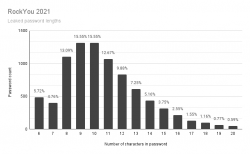
It would be safe to say, typical password is 9 or 10 characters short. Something a human being can remember and type easily into a login prompt.
Based on leaked material, how long a password should be?
The next obvious question is: Well then, if not 10 characters, how long the password should be?
Instant answer is: 21 characters. The file doesn't contain any of those.
Doing little bit of statistical analysis: If you're at 13 characters or more, your password is in the top-25%. At 15 or more, youre in top-7%. So, the obvious thing is to aim for 15 characters, no less than 13.
Given the lack of super-long passwords, I went a bit further with Rstudio. I went for the assumption, the password lenghts would form a gaussian bell curve. I managed to model the data points into a semi-accurate model which unfortunately for me is more inaccurate at the 18, 19, 20 characters than with the shorter ones.
If you want to improve my model, there is the human-readable HTML-version of R notebook. Also the R MD-formatted source is available.
Red line is the actual measured data points. Blue bars are what my model outputs.
Result is obvious: longer is better! If you're at 30 characters or more, your passwords can be considered unique. Typical systems crypt or hash the passwords in storage, making it is not feasible to brute-force a 30 char password. Also the reason why leaked RockYou2021 list doesn't contain any password of 21 or more characters: THEY ARE SO RARE!
Looks like me going for 60+ chars in my passwords is a bit over-kill. But hey! I'm simply future-proofing my passwords. If/when they leak, they should be out of brute-force attack, unless a super-weak crypto is used.
Wrap up
The key takeaways are:
- Password, a memorized secret is archaic and should be obsoleted, but this cannot be achieved anytime soon.
- Use password vault software that will suit your needs and you feel comfortable using.
- Never ever try to remember your passwords!
- Make sure to long passwords! Any password longer than 20 characters can be considered a long one.
Passwords - Part 1 of 2
Sunday, June 13. 2021
In computing, typing a password from keyboard is the most common way of authenticating an user.
NIST Special Publication 800-63B - Digital Identity Guidelines, Authentication and Lifecycle Management in its section 5.1.1 Memorized Secrets defines password as:
A Memorized Secret authenticator — commonly referred to as a password or, if numeric, a PIN — is a secret value intended to be chosen and memorized by the user.
Note how NIST uses the word "authenticator" as general means of authentication. A "memorized authenticator" is something you remember or know.
Wikipedia in its article about authentication has more of them factors:
- Knowledge factors: Something the user knows
- password, partial password, pass phrase, personal identification number (PIN), challenge response, security question
- Ownership factors: Something the user has
- wrist band, ID card, security token, implanted device, cell phone with built-in hardware token, software token, or cell phone holding a software token
- Inference factors: Something the user is or does
- fingerprint, retinal pattern, DNA sequence, signature, face, voice, unique bio-electric signals
Using multiple factors to log into something is the trend. That darling has multiple acronyms 2-FA (for two factor) or MFA (multi-factor). Also notable single-factor authentication method is to open the screen-lock of a cell-phone. Many manufacturers rely on inference factor to allow user access into a hand-held device. Fingerprint or facial recognition are very common.
Since dawn on mankind, humans have used passwords, a knowledge factor. Something only select persons would know. With computers, it began in MIT, where Mr. Fernando Corbató introduced it the first time. And oh boy! Have we suffered from that design choice ever since. To point out the obvious flaw in my statement: Nobody has shown us anything better. Over 70 years later, we're still using passwords to get into our systems and software as there is an obvious lack of good alternative.
SSH - Practical example
Going for a bit deeper into practical authentication: SSH - Secure Shell, the protocol used to access many modern computer systems when HTTP/HTTPS doesn't cut it.
Borrowing figure 2-2 from chapter 2.4. Authentication by Cryptographic Key of the book SSH: The Secure Shell - The Definite Guide:
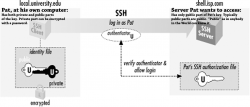
This figure depicts an user, Pat. To access a server shell.isp.com Pat will need a key. In SSH the key is a file containing result of complex mathematical operation taking randomness as input and saving the calculated values into two separate files. The file called "public key" must be stored and available on the server Pat is about to access. The second file "private key" must be kept private and in no circumstances nobody else must have access to results of the math. Having access to the set of files is an ownership factor. If Pat would lose access to the file, it wouldn't be possible to access the server anymore.
In this case Pat is a security conscious user. The private key has been encrypted with a password. Authentication process will require the result of the math, but even if the file would leak to somebody else, there is a knowledge factor. Anybody wanting to access the contents must know the password to decrypt it.
That's two-factor authentication in practice.
Traditional view of using passwords
Any regular Joe or Jane User will try to remember his/her passwords. To actually manage that, there can be a limited set of known passwords. One, two or three. More than four is not manageable.
When thinking about the password you chose, first check You Should Probably Change Your Password! | Michael McIntyre Netflix Special, or at least read the summary from Cracking Passwords with Michael McIntyre. Thinking of a good password isn't easy!
As Mr. McIntyre put it, many systems require the password to be complex ones. Xkcd #936 has a cartoon about it:
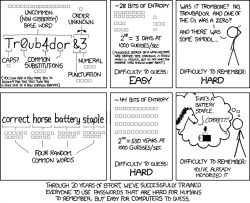
You may remember something long enough, but you won't remember many of them. Especially when there are tons of complex instructions on selecting the password. The NIST 63B in section 5.1.1.2 Memorized Secret Verifiers states following:
When processing requests to establish and change memorized secrets, verifiers SHALL compare the prospective secrets against a list that contains values known to be commonly-used, expected, or compromised.
For example, the list MAY include, but is not limited to:
- Passwords obtained from previous breach corpuses.
- Dictionary words.
- Repetitive or sequential characters (e.g. ‘aaaaaa’, ‘1234abcd’).
- Context-specific words, such as the name of the service, the username, and derivatives thereof.
Those four are only the basic requirements. Many systems have a set of rules of their own you must comply. Very tricky subject, this one.
My view on passwords
The attempt of trying to remember passwords or PIN-codes is futile. The entire concept of user simply storing a random(ish) word into brain and being able to type it via keyboard will eventually fail. The fact this will fail is the one fact bugging me. Why use something that's designed not to work reliably every time!
How I see password authentication is exactly like Pat's SSH-key. He doesn't know the stored values in his SSH private and public keys. He just knows where the files are and how to access them. In fact, he doesn't even care what values are stored. Why would he! It's just random numbers generated by a cryptographic algorithm. Who in their right mind would try to memorize random numbers!
My view is: a person needs to know (knowledge factor) exactly two (2) passwords:
- Login / Unlock the device containing the password vault software
- Decrypt password for vault software storing all the other passwords into all the other systems, websites, social media, work and personal, credit cards, insurance agreement numbers, and so on
Nothing more. Two passwords is manageable. Both of them don't need to be that long or complex, you will be entering them many times a day. The idea is not to use those passwords in any other service. If either of those two passwords will leak, there is only yourself to blame.
My own passwords
Obviously I live by the above rule. I have access (or had access at one point of time) to over 800 different systems and services. Yes, that's eight hundred. Even I consider that a lot. Most regular people have dozen or so passwords.
As already stated: I don't even care to know what my password to system XYZ is. All of my passwords are randomly generated and long or very long. In my password vault, I have 80+ character passwords. To repeat: I do not care what password I use for a service. All I care is to gain access into it when needed.
There are two pieces of software I've vetted and have my seal-of-approval of password storage: Enpass (https://www.enpass.io/) and BitWarden (https://bitwarden.com/). I've had numerous (heated) conversations with fans of such software products as Keepass, Lastpass, and so on. They are crap! I don't need them and won't be using them. My first password vault was SplashID (https://splashid.com/), but they somehow fell out of my radar. They were secure and all, but lack of flexibility and slow update cycle made me discontinue using them.
In case of my vault file leaking, to make it very difficult to crack open my precious data from SQLite Encryption Extension (SEE) AES-256 encrypted file there is a two-factor authentication in it. Anybody wanting access needs to know the encryption password and have the key-file containing a random nonce used to encrypt the vault.
Future of passwords
Using passwords is not going anywhere soon. A lot of services have mandatory or semi-mandatory requirement for multiple factors. Also additional security measures on top of authentication factors will be put into place. As an example user's IP-address will be saved and multiple simultaneous logins from different addresses won't be allowed. Second example: user's access geographic location will be tracked and any login attempts outside user's typical location will require additional authentication factors.
Passwords leak all the time and even passwords stored encrypted have been decrypted by malicious actors. That combined into the fact humans tend to use same passwords in multiple systems, when somebody has one of your passwords, the likelihood of gaining access to one of your accounts jumps a lot. In the net there are tons of articles like Why Is It So Important to Use Different Passwords for Everything? As doing that is a lot of hassle, many of you won't do it.
Cell phones or USB/Bluetooth dongles for authentication will gain popularity in the future, but to actually deploy them into use will require a professional. Organizations will do that, not home users.
Next part in my passwords-series is about leaked passwords.
